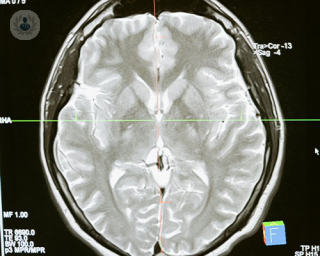What is the pituitary?
The pituitary is a gland located in the head that produces a number of hormones. These hormones help regulate the rest of the body and act as “slow-acting messengers” delivered to other parts of the body via the blood stream.
The pituitary is located behind the eyes and immediately under the brain. If it grows, it can start to push on the optic nerve, which is responsible for translating light entering your eyes into brain signals that allow you to see.

What is a pituitary tumour?
A pituitary tumour, or adenoma, is an abnormal growth of the pituitary gland. In most cases, the tumour is benign (non-cancerous), so it will tend to grow slowly, and it doesn’t spread to other areas of the body.
There are different types of pituitary tumour, depending on whether or not the tumour affects your hormone production:
- A prolactin-producing tumour is the most common type of secreting tumour, and can cause impotence, reduced sex drive, and in women, can cause your monthly periods to stop.
- An steroid-secreting tumour causes Cushing’s syndrome, which can cause weight gain, high blood pressure, diabetes, depression, and in women, increased facial hair.
- A growth hormone-secreting tumour causes a condition called acromegaly, which can cause your hands and feet to grow abnormally, as well as diabetes, high blood pressure, and sleep apnoea.
- A TSH-secreting tumour can cause weight loss, anxiety, and palpitations.
Non-secreting tumours do not cause hormonal symptoms, but all types of pituitary tumour can start to press on the optic nerve and interfere with your vision. If a pituitary tumour grows large enough, it can cause damage to the pituitary tissue and result in hormone deficiency.
How are pituitary tumours diagnosed?
Pituitary tumour diagnosis may involve a number of tests including:
- blood tests to see if your hormone levels are normal
- eye tests to see if there is any pressure on the optic nerve
- imaging such as a CT scan or MRI to get a detailed picture of the tissues and organs inside your head, and assess the size and position of any tumours present
What causes pituitary tumours?
The cause of pituitary tumours is unknown. In a few cases, pituitary tumour growth runs in the family. Researchers are currently looking into whether tumours could be the result of a genetic mutation.
How are pituitary tumours treated?
In most cases, pituitary tumours are removed with surgery. This generally involves entering the area where the pituitary gland sits through the nose. By removing the tumour, you can avoid any damage to the eyes caused by the tumour pressing on the optic nerve, as well as correct or prevent further hormone disturbances.
The risks of surgery include:
- bleeding
- leakage of brain fluid
- nasal pain or blockage
- decreased sense of smell
- a small risk of blindness or double vision
In some cases, pituitary tumours are treated with radiotherapy, providing the tumour is away from the optic nerve. This may also a necessary treatment if surgery was unsuccessful in removing the tumour.
Finally, you may be given medication to regulate your hormone production while you wait for surgery, or to regulate it in the long term if the tumour has damaged your pituitary gland permanently.
What kind of specialist treats pituitary tumours?
You will usually be seen by a multidisciplinary team, composed of:
- an endocrinologist (an expert in hormonal issues)
- a neurosurgeon (to discuss surgical treatment)
- a neuro-oncologist (to discuss radiotherapy)
Pituitary tumours
Professor Miles Levy - Endocrinology, diabetes & metabolism
Created on: 07-12-2017
Updated on: 09-15-2023
Edited by: Sophie Kennedy
What is the pituitary?
The pituitary is a gland located in the head that produces a number of hormones. These hormones help regulate the rest of the body and act as “slow-acting messengers” delivered to other parts of the body via the blood stream.
The pituitary is located behind the eyes and immediately under the brain. If it grows, it can start to push on the optic nerve, which is responsible for translating light entering your eyes into brain signals that allow you to see.

What is a pituitary tumour?
A pituitary tumour, or adenoma, is an abnormal growth of the pituitary gland. In most cases, the tumour is benign (non-cancerous), so it will tend to grow slowly, and it doesn’t spread to other areas of the body.
There are different types of pituitary tumour, depending on whether or not the tumour affects your hormone production:
- A prolactin-producing tumour is the most common type of secreting tumour, and can cause impotence, reduced sex drive, and in women, can cause your monthly periods to stop.
- An steroid-secreting tumour causes Cushing’s syndrome, which can cause weight gain, high blood pressure, diabetes, depression, and in women, increased facial hair.
- A growth hormone-secreting tumour causes a condition called acromegaly, which can cause your hands and feet to grow abnormally, as well as diabetes, high blood pressure, and sleep apnoea.
- A TSH-secreting tumour can cause weight loss, anxiety, and palpitations.
Non-secreting tumours do not cause hormonal symptoms, but all types of pituitary tumour can start to press on the optic nerve and interfere with your vision. If a pituitary tumour grows large enough, it can cause damage to the pituitary tissue and result in hormone deficiency.
How are pituitary tumours diagnosed?
Pituitary tumour diagnosis may involve a number of tests including:
- blood tests to see if your hormone levels are normal
- eye tests to see if there is any pressure on the optic nerve
- imaging such as a CT scan or MRI to get a detailed picture of the tissues and organs inside your head, and assess the size and position of any tumours present
What causes pituitary tumours?
The cause of pituitary tumours is unknown. In a few cases, pituitary tumour growth runs in the family. Researchers are currently looking into whether tumours could be the result of a genetic mutation.
How are pituitary tumours treated?
In most cases, pituitary tumours are removed with surgery. This generally involves entering the area where the pituitary gland sits through the nose. By removing the tumour, you can avoid any damage to the eyes caused by the tumour pressing on the optic nerve, as well as correct or prevent further hormone disturbances.
The risks of surgery include:
- bleeding
- leakage of brain fluid
- nasal pain or blockage
- decreased sense of smell
- a small risk of blindness or double vision
In some cases, pituitary tumours are treated with radiotherapy, providing the tumour is away from the optic nerve. This may also a necessary treatment if surgery was unsuccessful in removing the tumour.
Finally, you may be given medication to regulate your hormone production while you wait for surgery, or to regulate it in the long term if the tumour has damaged your pituitary gland permanently.
What kind of specialist treats pituitary tumours?
You will usually be seen by a multidisciplinary team, composed of:
- an endocrinologist (an expert in hormonal issues)
- a neurosurgeon (to discuss surgical treatment)
- a neuro-oncologist (to discuss radiotherapy)


How can pituitary tumours affect daily life?
By Mr Samih Hassan
2025-01-14
Here to help us find out what we need to know about pituitary tumours is revered consultant neurosurgeon, Mr Samih Hassan. See more


Understanding pituitary tumours
By Professor Miles Levy
2025-01-13
The pituitary is a gland located at the base of the brain and it is responsible for managing the hormones that determine the body’s growth, metabolism, and sexual reproduction. Dysfunction of this gland will take a toll on the body. Sometimes the gland does not work for simple operational reasons, but sometimes it is due to the presence of a tumour. See more


Endoscopic pituitary surgery explained
By Mr Alireza Shoakazemi
2025-01-12
Here, esteemed consultant neurosurgeon, Mr Alireza Shoakazemi, provides us with a detailed insight into endoscopic pituitary surgery, including how exactly it differs from more traditional surgical approaches. See more


Pituitary tumours: Everything you need to know
By Miss Eleni Maratos
2025-01-12
Pituitary tumours are a common form of cancer, that need to be diagnosed and treated as soon as possible. In her latest online article, consultant neurosurgeon Miss Eleni Maratos offers her expert insight into the treatment of these tumours. See more
Experts in Pituitary tumours
-
Mr Sinan Barazi
NeurosurgeryExpert in:
- Meningioma
- Trigeminal neuralgia
- Acoustic neuroma
- Pituitary tumours
- Endoscopic skull base surgery
- Facial pain
-
Dr Samer Al-Sabbagh
Endocrinology, diabetes & metabolismExpert in:
- Thyroid disorders
- Adrenal gland disorders
- Parathyroid gland
- Diabetes
- Hypogonadism
- Pituitary tumours
-
Professor Parag Singhal
Endocrinology, diabetes & metabolismExpert in:
- Thyroid disorders
- Hypothyroidism
- Hyperthyroidism
- Diabetes
- Adrenal gland disorders
- Pituitary tumours
-
Dr Florian Wernig
Endocrinology, diabetes & metabolismExpert in:
- Pituitary tumours
- Adrenal gland disorders
- Thyroid disorders
- Neuroendocrine tumours
- Hyperparathyroidism
- Polycystic ovary syndrome (PCOS)
-
Dr Bernard Khoo
Endocrinology, diabetes & metabolismExpert in:
- Neuroendocrinology
- Adrenal gland disorders
- Thyroid disorders
- Obesity
- Pituitary tumours
- Parathyroid gland
- See all

Elstree Waterfront Outpatients Centre (HCA)
Elstree Waterfront Outpatients Centre (HCA)
Elstree Road, WD6 3BS
No existe teléfono en el centro.
By using the telephone number provided by TOP DOCTORS, you automatically agree to let us use your phone number for statistical and commercial purposes. For further information, read our Privacy Policy
Top Doctors

Cleveland Clinic Portland Place Outpatient Centre
Cleveland Clinic Portland Place Outpatient Centre
24 Portland Place, W1B 1LU
No existe teléfono en el centro.
By using the telephone number provided by TOP DOCTORS, you automatically agree to let us use your phone number for statistical and commercial purposes. For further information, read our Privacy Policy
Top Doctors

Cleveland Clinic London Hospital
Cleveland Clinic London Hospital
33 Grosvenor Place
No existe teléfono en el centro.
By using the telephone number provided by TOP DOCTORS, you automatically agree to let us use your phone number for statistical and commercial purposes. For further information, read our Privacy Policy
Top Doctors
-
Elstree Waterfront Outpatients Centre (HCA)
Elstree Road, WD6 3BS, ElstreeExpert in:
- Blood test
- Cardiology
- Dermatology
- Diagnostic Imaging
- Neurology
- Paediatrics
-
Cleveland Clinic Portland Place Outpatient Centre
24 Portland Place, W1B 1LU, Central LondonExpert in:
- Diagnosis of Cancer
- Diagnostics
- Women’s health
- Sports Medicine
- General practice
- Health check up
-
Cleveland Clinic London Hospital
33 Grosvenor Place, Central LondonExpert in:
- Cardiology
- Colorectal surgery
- Minimal access surgery (keyhole surgery)
- Gallbladder surgery
- Diagnostic Imaging
- Ultrasound
- See all
- Most viewed diseases, medical tests, and treatments
- Trigeminal neuralgia
- Alzheimer's disease
- Cluster headaches
- Tension headache
- Chronic headache
- Peripheral nerve block
- Hormone therapy
- Autoimmune diseases
- Lumbar herniated disc
- Spinal surgery








